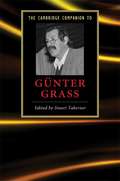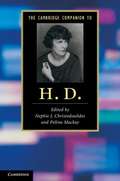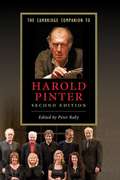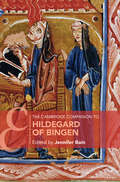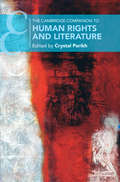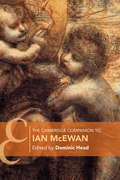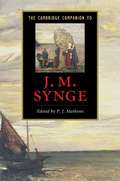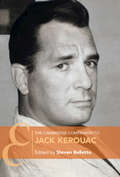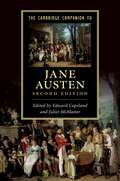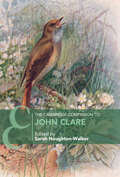- Table View
- List View
The Cambridge Companion to Günter Grass
by Stuart TabernerG8nter Grass is Germany's best-known and internationally most successful living author, from his first novel The Tin Drum to his recent controversial autobiography. He is known for his tireless social and political engagement with the issues that have shaped post-War Germany: the difficult legacy of the Nazi past, the Cold War and the arms race, environmentalism, unification and racism. He was awarded the Nobel Prize for literature in 1999. This Companion offers the widest coverage of Grass's oeuvre across the range of media in which he works, including literature, television and visual arts. Throughout, there is particular emphasis on Grass's literary style, the creative personality which inhabits all his work, and the impact on his reputation of revelations about his early involvement with Nazism. The volume sets out, in a fresh and lively fashion, the fundamentals that students and readers need in order to understand Grass and his individual works.
The Cambridge Companion to H.D.
by Nephie J. Christodoulides Polina MackayH. D. (Hilda Doolittle) was one of the central figures in literary modernism in the 1910s. She collaborated with Ezra Pound and others and played an important role in the early development of modernist poetry. This Cambridge Companion is a critical introduction to H. D. containing essays on all her major works. The first part explores the author's initial exclusion from the canon and her subsequent reinstatement; her tendency to merge fact with fiction in her autobiographical texts; her contribution to the little magazines; her relation to modernism; her representation of gender; and her influence on later generations of writers. The second part offers close and accessible critical analyses of H. D. 's style, her poems Hymen and Trilogy, her novels HERmione and Majic Ring, her understanding of translation as literary practice and of her notion of history in Tribute to Freud and The Gift.
The Cambridge Companion to Hans Urs Von Balthasar
by David Moss Edward T. OakesA wide range of theologians outline and assess the work of Hans Urs von Balthasar (1905-1988).
The Cambridge Companion to Harold Pinter
by Peter RabyHarold Pinter was one of the world's leading and most controversial writers, and his impact and influence continues to grow. This Companion examines the wide range of Pinter's work - his writing for theatre, radio, television and screen, and also his highly successful work as a director and actor. Substantially updated and revised, this second edition covers the many developments in Pinter's career since the publication of the first edition, including his Nobel Prize for Literature win in 2005, his appearance in Samuel Beckett's play Krapp's Last Tape and recent productions of his plays. Containing essays written by both academics and leading practitioners, the volume places Pinter's writing within the critical and theatrical context of his time and considers its reception worldwide. Including three new essays, new production photographs, five updated and revised chapters and an extended chronology, the Companion provides fresh perspectives on Pinter's work.
The Cambridge Companion to Harriet Beecher Stowe
by Cindy WeinsteinThis Companion provides fresh perspectives on the frequently read classic Uncle Tom's Cabin as well as on topics of perennial interest, such as Harriet Beecher Stowe's representation of race, her attitude to reform, and her relationship to the American novel. Cindy Weinstein comprehensively investigates Stowe's impact on the American literary tradition and the novel of social change.
The Cambridge Companion to Hemingway
by Scott DonaldsonThis Companion serves both as an introduction for the interested reader, and as a source of the best recent scholarship on the author and his works. In addition to analyzing his major texts, these chapters provide insight on Hemingway's relationship with gender history, journalism, fame, and the political climate of the 1930s. Contributors include both the most distinguished established figures and brilliant newcomers, all chosen with regard to the clarity and readability of their prose.
The Cambridge Companion to Henry David Thoreau
by Joel MyersonThe Cambridge Companion to Henry David Thoreau is intended as an accessible guide to reading and understanding the works of Thoreau. Presenting essays by a distinguished array of contributors, the Companion is a valuable resource for historical and contextual material, whether on early writings like A Week on the Concord and Merrimack Rivers, on the monumental Walden, or on his assorted journals and later books. It also serves in some ways as a biographical guide, offering new insights into his turbulent publishing career, and his brief but extraordinarily original life. In short, the Companion helps the reader come to Thoreau's writings, as he would say, â deliberately and reservedly' by suggesting how Thoreau uses language, how his biography informs his writing, how personal and historical influences shaped his career, and how his writings function as literary works.
The Cambridge Companion to Henry Fielding
by Claude RawsonNow best known for three great novels - Tom Jones, Joseph Andrews and Amelia - Henry Fielding (1707-1754) was one of the most controversial figures of his time. Prominent first as a playwright, then as a novelist and political journalist, and finally as a justice of peace, Fielding made a substantial contribution to eighteenth-century culture, and was hugely influential in the development of the novel as a form, both in Britain and more widely in Europe. This collection of specially-commissioned essays by leading scholars describes and analyses the many facets of Fielding's work in theatre, fiction, journalism and politics. In addition it assesses his unique contribution to the rise of the novel as the dominant literary form, the development of the law, and the political and literary culture of eighteenth-century Britain. Including a Chronology and Guide to Further Reading, this volume offers a comprehensive account of Fielding's life and work.
The Cambridge Companion to Henry James
by Jonathan FreedmanThe Cambridge Companion to Henry James is intended to provide a critical introduction to James' work. Throughout the major critical shifts of the past fifty years, and despite suspicions of the traditional high literary culture that was James' milieu, as a writer he has retained a powerful hold on readers and critics alike. All essays are written at a level free from technical jargon, designed to promote accessibility to the study of James and his work.
The Cambridge Companion to Herman Melville
by Robert S. LevineThe Cambridge Companion to Herman Melville is intended to provide a critical introduction to Melville's work. The essays have been specially commissioned for this volume, and provide a comprehensive overview of Melville's career. All of Melville's novels are discussed, as well as most of his poetry and short fiction. Written at a level both challenging and accessible, the volume provides fresh perspectives on an American author whose work continues to fascinate readers and stimulate new study.
The Cambridge Companion to Hildegard of Bingen (Cambridge Companions to Literature)
by Jennifer BainThis specially commissioned collection of thirteen essays explores the life and works of Hildegard of Bingen (1098-1179), monastic founder, leader of a community of nuns, composer, active correspondent, and writer of religious visions, theological treatises, sermons, and scientific and medical texts. Aimed at advanced university students and new Hildegard researchers, the essays provide a broad context for Hildegard's life and monastic setting, and offer comprehensive discussions on each of the main areas of her output. Engagingly written by experts in medieval history, theology, German literature, musicology, and the history of medicine, the essays are grounded in Hildegard's twelfth-century context, and investigate her output within its monastic and liturgical environments, her reputation during and after her life, and the materiality of the transmission of her works, considering aspects of manuscript layout, illumination, and scribal practices at her Rupertsberg monastery.
The Cambridge Companion to Homer
by Robert FowlerThe two Homeric poems, the Iliad and the Odyssey, have long been considered masterpieces, and their influence on subsequent Greek and Western literature has been immense. An international team of experts discusses the poems, their background and composition, and subsequent reception to the present day. Each chapter features contemporary critical insights and closes with a guide to further reading on the topic.
The Cambridge Companion to Horace
by Stephen HarrisonHorace is a central author in Latin literature. His work spans a wide range of genres, from iambus to satire, and odes to literary epistle, and he is just as much at home writing about love and wine as he is about philosophy and literary criticism. He also became a key literary figure in the regime of the Emperor Augustus. In this 2007 volume a superb international cast of contributors present a stimulating and accessible assessment of the poet, his work, its themes and its reception. This provides the orientation and coverage needed by non-specialists and students, but also suggests provoking perspectives from which specialists may benefit. Since the last general book on Horace was published half a century ago, there has been a sea-change in perceptions of his work and in the literary analysis of classical literature in general, and this territory is fully charted in this Companion.
The Cambridge Companion to Human Rights and Literature (Cambridge Companions to Literature)
by Crystal ParikhLiterature has been essential to shaping the notions of human personhood, good life, moral responsibility, and forms of freedom that have been central to human rights law, discourse, and politics. The literary study of human rights has also recently generated innovative and timely perspectives on the history, meaning, and scope of human rights. The Cambridge Companion to Human Rights and Literature introduces this new and exciting field of study in the humanities. It explores the historical and institutional contexts, theoretical concepts, genres, and methods that literature and human rights share. Equally accessible to beginners in the field and more advanced researches, this Companion emphasizes both the literary and interdisciplinary dimensions of human rights and the humanities.
The Cambridge Companion to Ian McEwan (Cambridge Companions to Literature)
by Dominic HeadThis Companion showcases the best scholarship on Ian McEwan's work, and offers a comprehensive demonstration of his importance in the canon of international contemporary fiction. The whole career is covered, and the connections as well as the developments across the oeuvre are considered. The essays offer both an assessment of McEwan's technical accomplishments and a sense of the contextual factors that have provided him with inspiration. This volume has been structured to highlight the points of intersection between literary questions and evaluations, and the treatment of contemporary socio-cultural issues and topics. For the more complex novels - such as Atonement - this book offers complementary perspectives. In this respect, The Cambridge Companion to Ian McEwan serves as a prism of interpretation, revealing the various interpretive emphases each of McEwan's more complex works invite, and to show how his various recurring preoccupations run through his career.
The Cambridge Companion to Ibsen
by James McfarlaneIn the history of modern theatre, Ibsen is one of the dominating figures. The sixteen chapters of this 1994 Companion explore his life and work, providing an invaluable reference work for students. In chronological terms they range from an account of Ibsen's earliest pieces, through the years of rich experimentation, to the mature 'Ibsenist' plays that made him famous towards the end of the nineteenth century. Among the thematic topics are discussions of Ibsen's comedy, realism, lyric poetry and feminism. Substantial chapters account for Ibsen's influence on the international stage and his challenge to theatre and film directors and playwrights today. Essential reference materials include a full chronology, list of works and essays on twentieth-century criticism and further reading.
The Cambridge Companion to Irish Modernism
by Joe ClearyThe story of Irish modernism constitutes a remarkable chapter in the movement's history. This volume serves as an incisive and accessible overview of that brilliant period in which Irish artists not only helped to create a distinctive nationalist literature but also changed the face of European and anglophone culture. This Companion surveys developments in modernist poetry, drama, fiction and the visual arts. Early innovators, such as Oscar Wilde, George Bernard Shaw, Jack B. Yeats and James Joyce, as well as late modernists, including Elizabeth Bowen, Samuel Beckett, Flann O'Brien, Máirtín Ó Cadhain and Francis Bacon, all appear here. Significantly, however, this volume ranges beyond such iconic figures to open up new ground with chapters on Irish women modernists, Irish American modernism, Irish-language modernism and the critical reception of modernism in Ireland.
The Cambridge Companion to J. M. Synge
by P. J. MathewsJohn Millington Synge was a leading literary figure of the Irish Revival who played a significant role in the founding of Dublin's Abbey Theatre in 1904. This Companion offers a comprehensive introduction to the whole range of Synge's work from well-known plays like Riders to the Sea, The Well of the Saints and The Playboy of the Western World, to his influential prose work The Aran Islands. The essays provide detailed and insightful analyses of individual texts, as well as perceptive reflections on his engagements with the Irish language, processes of decolonisation, gender, modernism and European culture. Critical accounts of landmark productions in Ireland and America are also included. With a guide to further reading and a chronology, this book will introduce students of drama, postcolonial studies, and Irish studies as well as theatregoers to one of the most influential and controversial dramatists of the twentieth century.
The Cambridge Companion to Jack Kerouac (Cambridge Companions to Literature)
by Steven BellettoJack Kerouac is among the most important and influential writers to emerge from mid-twentieth century America. Founder of the Beat Generation literary movement, Kerouac's most famous novel, On the Road, was known as the bible of this generation, and inspired untold people to question the rigid social and cultural expectations of 1950s America. And yet despite its undeniable influence, On the Road is only a small piece of Kerouac's literary achievement, and there are now well over forty Kerouac books published. The centerpiece to this work is Kerouac's multi-volume Duluoz Legend, named for his fictional alter-ego, Jack Duluoz, and comprising numerous books written over decades that together tell the story of Duluoz's life and times. This volume offers fresh perspectives on his multifaceted body of work, ranging from detailed analyses of his most significant books to wide-angle perspectives that place Kerouac in key literary, theoretical, and cultural contexts.
The Cambridge Companion to James Baldwin
by Michele ElamThis Companion offers fresh insight into the art and politics of James Baldwin, one of the most important writers and provocative cultural critics of the twentieth century. Black, gay, and gifted, he was hailed as a 'spokesman for the race', although he personally, and controversially, eschewed titles and classifications of all kinds. Individual essays examine his classic novels and nonfiction as well as his work across lesser-examined domains: poetry, music, theatre, sermon, photo-text, children's literature, public media, comedy, and artistic collaboration. In doing so, The Cambridge Companion to James Baldwin captures the power and influence of his work during the civil rights era as well as his relevance in the 'post-race' transnational twenty-first century, when his prescient questioning of the boundaries of race, sex, love, leadership, and country assume new urgency.
The Cambridge Companion to James Joyce
by Derek AttridgeIncluding several new and revised essays, reflecting increasing emphasis on Joyce's politics, this Companion focuses on the importance of his engagement with Ireland, and the changes wrought by gender studies on criticism of his work. The second edition features essays by an international team of leading scholars geared to provoking thought and discussion. Supplementary reading lists and an extended bibliography will offer readers the necessary tools for additional informed exploration of Joyce. First Edition Hb (1990): 0-521-33014-9 First Edition Pb (1990): 0-521-37673-4
The Cambridge Companion to Jane Austen
by Edward Copeland Juliet Mcmaster"Jane Austen's stock in the popular marketplace has never been higher, while academic studies continue to uncover new aspects of her engagement with her world. This fully updated edition of the acclaimed Cambridge Companion offers clear, accessible coverage of the intricacies of Austen's works in their historical context, with biographical information and suggestions for further reading. Major scholars address Austen's six novels, the letters and other works, in terms accessible to students and the many general readers, as well as to academics. With seven new essays, the Companion now covers topics that have become central to recent Austen studies, for example, gender, sociability, economics, and the increasing number of screen adaptations of the novels"--"The image that Henry Austen creates - at odds with the evidence that both Austen's letters and her publishing decisions offer of her professionalism - is precisely the one that so annoyed Henry James, according to Brian Southam: 'the myth of the inspired amateur, the homely spinster who put down her knitting needles to take up her pen'. That myth, and others like it, have prevented subsequent readers from understanding that, for Austen, being a professional writer was, apart from her family, more important to her than anything else in her life. Austen wrote when opportunities for women to publish had never been greater, and from her childhood her aim was to see her works in print. She collected her juvenilia in volumes made to resemble published books as closely as possible"--
The Cambridge Companion to Jewish American Literature
by Hana Wirth-Nesher Michael P. KramerJewish Americans produced some of the most important writing in the U. S. in the twentieth century. This Companion addresses the distinctive Jewish American contribution to American literary criticism, poetry and popular culture. It establishes the broadest possible context for the discussion of Jewish American identity as it intersects with the corpus of American literature. Featuring a chronology and guide to further reading, the volume is valuable to scholars and students alike.
The Cambridge Companion to John Clare (Cambridge Companions to Literature)
by Sarah Houghton-WalkerThe fascinations of John Clare's life are manifold. A labouring-class poet and naturalist, he was lionised in the early 1820s but spent his final decades incarcerated in asylums. In this Companion leading scholars illuminate Clare's rich life and writing, situating each within a range of critical contexts. Essays rooted in discourses as diverse as ecocriticism, aesthetics, religion, health, and time are accompanied by explorations of the construction of the idea (including the self-identity) of Clare through writing and images. The collection also traces influences upon Clare, and considers the ways in which he has influenced subsequent poets in turn. The volume includes a chronology and an invaluable guide to further reading, and provides students with a firm grounding in Clare's writings and his critical reception: this is an indispensable guide to the poet and his work.
The Cambridge Companion to John Donne
by Achsah GuibboryThe Cambridge Companion to John Donne, first published in 2006, introduces students (undergraduate and graduate) to the range, brilliance, and complexity of John Donne. Sixteen essays, written by an international array of leading scholars and critics, cover Donne's poetry (erotic, satirical, devotional) and his prose (including his Sermons and occasional letters). Providing readings of his texts and also fully situating them in the historical and cultural context of early modern England, these essays offer the most up-to-date scholarship and introduce students to the current thinking and debates about Donne, while providing tools for students to read Donne with greater understanding and enjoyment. Special features include a chronology; a short biography; essays on political and religious contexts; an essay on the experience of reading his lyrics; a meditation on Donne by the contemporary novelist A. S. Byatt; and an extensive bibliography of editions and criticism.
